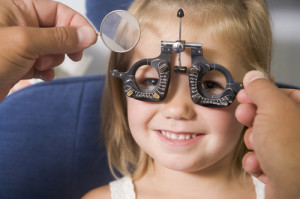EYE EXAMS FOR KIDS
 As parents, it is easy to know when your child is sick or needs to be taken to the doctor. It is often more difficult for your child to know and tell you when they aren’t seeing as clearly as they should be. This is especially true with infants and toddlers.
As parents, it is easy to know when your child is sick or needs to be taken to the doctor. It is often more difficult for your child to know and tell you when they aren’t seeing as clearly as they should be. This is especially true with infants and toddlers.
Unlike adults that have had regular exams, children who have never had an exam do not have a baseline to measure their vision from. The world is new and exciting to them and they may not notice that what they are seeing is not as clear as they should be. As a parent, you can help to ensure they are experiencing life to its fullest by scheduling routine eye exams.
According to the American Optometric Association, infants should have their first eye exam at 6 months of age. Children should then receive their next eye exam at the age of 3 and then again at age 5-6, before they enter kindergarten.
As your children age, it is recommended that they receive a comprehensive eye exam every two years if no vision correction is required and every year if vision correction is required. While pre-schools and elementary schools do provide free eye screenings, they are not nearly as involved as a screening by your optometrist.
School exams check the basics, using the Seeing Eye Chart but do not look into the eye to see if there are any other issues that need to be corrected before permanent damage occurs. Often these screenings are inaccurate and can miss important eye issues because they are always not done by eye doctors but by school nurses or medical assistants not trained to pick up advanced eye issues. Reading a chart or looking into a machine is not a proper assessment of the visual function of the eye. An eye doctor can see if a nonverbal or young child needs glasses by dilating them and using a special scope that shines light into their eyes to read their glasses prescription.
As children grow they use their vision to develop skills such as:
- Eye teaming (binocularity) skills.
- Focusing skills.
- Peripheral awareness.
- Eye movement skills.
- Eye/hand coordination.
It is important to give your child the proper start as you get ready to send them on their first day of school. If they have trouble seeing they will struggle to learn. At a young age we learn from what we see, from how we see other people interact and what the teacher writes on the board. If your child does not have the ability to see clearly, they are already starting out a few steps behind.
As parents, we would do anything to be able to help our children to be the best they can be. Vision is often one area where children may not know that something isn’t right. If they have poor vision they most times won’t feel pain or discomfort, they will simply just struggle to see in clarity. For this reason, they may not tell you that they are having trouble as blurry vision may have become “normal” to them.
As you complete your back to school to do list, be sure to schedule your child’s eye exam.
About the author: John D. Bissell, owner of Bissell Eye Care and Tri-State Low Vision Services, offers comprehensive eye examinations for the entire family, ocular disease detection and treatment, eye glasses, sun glasses, active wear, contact lenses, and low vision examinations for those with significant vision loss. He has undergone specialized training for treatment of low vision by the International Academy of Low Vision Specialists utilizing customized telescopic eyeglasses, prisms and telescopic implants for patients who qualify. The practice accepts most types of vision and health insurance plans.
